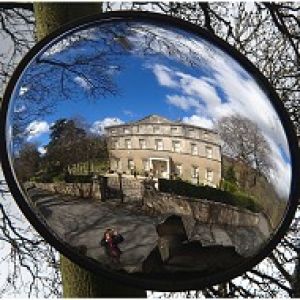Blowhole on Ramsey Island (backblip)
The day started very quietly, because our B and B is out of town, in a village location. I was up early, so I chatted to the landlady and she suggested a walk around the top of the village, overlooking the harbour and the town of Fishguard. It was a beautiful sunny day, and the walk went up and down, and finished opposite Myrtle's pharmacy just along the road from where I'd started. Now that I'm writing about it 2 weeks later, it reminds me of walking around Pulpit Hill in Oban, except that I could hear Dylan Thomas' poetry in my ear (scenes from Under Milk Wood were filmed in Fishguard).
After our first cooked breakfast (delicious) the weather turned grim, as expected. The CoVid timetable for buses meant that not every bus was running every day, but we figured that St David's would be a good place to begin our exploration of West Pembrokeshire. On alighting from the bus, we found ourselves outside a shop that sold hand made cushions in one
half, and boat trips in the other. I had had no success in booking a boat trip online before arrival in Wales, and figured that GG, my companion, would have to wait for another day to see puffins. We went into the shop, on spec, and enquired, and were told that there were two places left on a Sunset Shearwater trip that evening. Better than we could have hoped for! After working about how to get to the departure point (Celtic coaster bus) and back to Goodwick after the trip (taxi) and then booking the taxi, we reserved places for the trip, and went on our way.
We found the cathedral, and tons of tourists (yes, we're tourists too) and were surprised to find that it was closed because the BBC was there. Never mind, we said, and wandered around the valley in which it was set (to hide it from the Viking Invaders) and peered through the door of the Bishop's Palace. All very amazing, all very closed, all very Covid. Even the gift shop. Clearly the CoVid rules are taken much more seriously in Wales than in England.
During the heavy rainy periods we managed to fit in two trips to the pub, the Bishops, once for coffee and once for lunch, then perused a few shops and small galleries. GG made friends with a Spanish family who were eating ice cream, once the weather had turned good again. I bought some ridiculous skiing socks because I knew the boat trip would be cold. They were blue and grey. My trousers were bright pink. My trainers were black. Amazingly, I managed not to break into a folk dance while wearing them, or buy a hat to match.
At last the time came to board the coastal bus to St Justininan's, which is a cove with a former lifeboat station and the current lifeboat station, and a very large house to rent. Two boat companies operate from here, and we enjoyed watching the RIBs (rigid inflatable boats) come in and out. When it was our turn, we were taken up the steep steps and down the other side, and onto the boat. For some reason I'd been terrified of going on a RIB, but it was fine. I think there were just twelve of us in total on board.
The boat took us out to Ramsey island, which is a nature reserve; in in and out of caves and bird watching spots. As the brochure says, "at Falcon boats we know every nook and cranny, every rock where seals haul out to bask in the sun...and every emerald cave". The blowhole above was captured in one such spot. From Ramsey we went on to North Bishop island, where puffins flew out from cliffs above our heads, diving into the sea in search of sand eels to feed their young. I've sat next to puffins before on the Treshnish isles, but never had them flying out over my head. Some people on the boat, including GG, were expecting them to be much larger (maybe they hadn't watched the right wildlife documentaries).
As the sun began to set, we headed back to Ramsey and the mainland, while approximately 360,000 Manx shearwaters (half the world's population of these birds) swooped around us, wingtips skimming the water. Shearwaters cannot fight predators on land, being more adapted to water, so they spend the day hunting and feeding at sea, only returning to their burrows under cover of cloud and falling dusk. They call as they swoop and fly, until the boat leaves them at last and returns to land.
It was (and I quote the brochure again) "the perfect end to the day in Pembrokeshire".

Comments
Sign in or get an account to comment.


